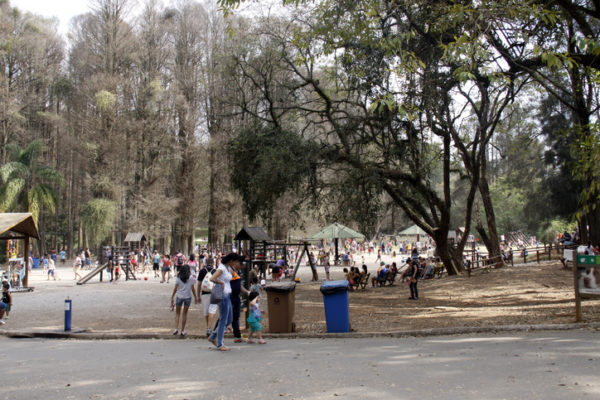Should We Be (Re)connecting Children with ‘Nature’ and ‘Natural’ Resources?
This blog by Peter Kraftl, Principal Investigator of the project (Re)Connect the Nexus: Young Brazilians’ Experiences of and Learning About Food-Water-Energy, was originally posted on the RGS-IGB Geography Directions website.

The Guardian newspaper recently reported that the UK’s National Trust had been criticised for halting access to one of its properties by a Forest School. The Trust – which is a large landowner and preserves historic sites – has been a regular and ardent promoter of ‘natural childhoods’. As they state, ‘our mission is to reconnect a generation of children with nature and the outdoors’. Nevertheless, the Trust took this decision following concerns that the Forest School’s outdoor education activities had been endangering ancient trees and wildlife.
Discussion around the Trust’s decision was replete with a range of widespread assumptions about the need to (re)connect children – and especially urban children – with natures. Indeed, the Forest School’s response was to claim that the decision countered the National Trust’s own campaign to get children outdoors. Yet missing from this debate was a discussion about the relative merits of the idea that (re)connecting children with natures will be an unequivocally and universally good thing. Indeed, wider, and often powerful calls for children to play and learn outside tend to make assumptions about what ‘nature’ is (very often, apparently ‘pristine’ woodland) and about how children will respond to and experience those environments (which can vary significantly depending on a number of social and cultural factors).
In our recent paper for Transactions of the Institute of British Geographers, we offer a different perspective on the idea that children should be (re)connected with natures. We also question related arguments that they should be better connected to ‘natural’ resources, like food, water, and energy. Our approach is different for two reasons. Firstly, we foreground critiques of the idea of (re)connection, but equally acknowledge that some forms of outdoor play and learning can be beneficial. Secondly, our paper is based on research outside the Minority Global North (and especially Anglophone countries), where ideas of (re)connection are particularly strong.
Our research focused on young people’s experiences of and learning about the food-water-energy nexus in São Paulo State, Brazil. It was therefore concerned with the many ways in which young people (aged 10-24) sourced, produced, prepared, consumed and talked about food, water, and energy (and much more besides). Our paper draws on detailed qualitative research with a range of key professionals and with 48 young people. Key to our approach was the integration of recent forms of ‘nexus thinking’ into our methods – enabling us to trace connections and disconnections between different resources in people’s lives and across spatial scales.
Our work complements, challenges and extends calls to (re)connect children with nature in a range of ways. On the one hand, it highlights how food, water, and energy are not simply resources whose provenance one may either know or not know but are intimately entangled within everyday concerns. For instance, one boy was able to visualise the infrastructures and journeys of water at a scale ranging over hundreds of kilometres – but only because he had picked up these knowledges through everyday interactions with water pipes, pumps, and ditches in his local community. On the other hand, young people in our research connected discussions of ‘natural’ resources with a keen awareness of social injustices in Brazil, particularly during the ongoing political-financial crisis. They highlighted that not only were they ‘connected’ with the sources of food, water, and energy, but that in turn questions of ‘resources’ were intimately connected with inequalities in accessing those resources, and about which they felt very strongly.
Our paper does not suggest completely dismissing the idea of (re)connecting children with nature. Rather it asks geographers, childhood studies scholars and educators to acknowledge that children and young people are connected with ‘natures’ and with ‘natural resources’ – albeit in ways that might go beyond certain assumptions in some Anglophone contexts. Therefore, we pose the question: what might Forest Schools and other nature-based, environmental or outdoor forms of education learn from contexts like Brazil about the multiple ways that children already are, and could, be (re)connected with nature(s)?
About the author: Peter Kraftl is Professor of Human Geography at the University of Birmingham, UK, and led a team of UK and Brazilian academics researching young Brazilians’ experiences of, and learning about, the food-water-energy nexus in Brazil. Further information about the project, and the rest of the research team, is available at the project’s website: http://www.foodwaterenergynexus.com/
Barkham, P. 2018. National Trust criticised for evicting a forest school from its woods. The Guardian. Retrieved from: https://www.theguardian.com/uk-news/2018/oct/13/national-trust-criticised-for-evicting-a-forest-school-from-its-woods
Glum, J. 2017. Origin of Food: Children say cheese comes from plants, pasta from animals. Newsweek. Retrieved from: https://www.newsweek.com/kids-food-nutrition-misconceptions-survey-624337
The National Trust https://www.nationaltrust.org.uk/children-and-nature